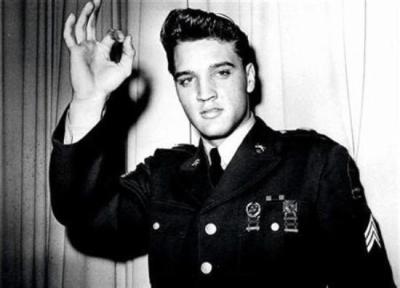What ‘Elvis’ got just right

In Baz Lurhmann’s new epic biopic, Elvis, we learn many things about the “King of Rock and Roll” and how he became a cultural icon, including an introduction to his gospel roots.
Early in the beautifully photographed $85 million feature film, a young Elvis Presley stumbles on a tent revival near his Tupelo, Mississippi home. Curious about what’s happening inside the big top, Elvis opens the flap to discover a large group of people worshipping God. They invite him inside, where the powerful music and dancing quickly sweep him up.
By their very nature, biopics tend to play fast and loose with the facts, but that scene is closer to the truth than fiction. I know this because in my new book, Lennon, Dylan, Alice & Jesus, I write about Elvis Presley’s faith journey in a chapter titled “The Gospel Roots of Rock’ n’ Roll.”
Many of rock’s earliest stars got their inspiration and started in church. Elvis Presley, Johnny Cash, Jerry Lee Lewis, and Carl Perkins were all church-going country boys from impoverished, hard-working families, many of whom had alcoholism and addiction in their blood.
Sin, guilt, and unrelenting hardship made for a heavy bottle to nurse. These four young men all came up that same way. The pressures they grew up with built until they exploded into a new sound. Of the four stars, Elvis burned the brightest and the fastest.
Presley grew up in a small, two-bedroom house in Tupelo, nestled in a group of tiny, rough-hewn homes. The house had no electricity and sat at the edge of a dilapidated neighborhood called Shake Rag. The folks were dirt poor, and the music from Shake Rag’s house parties, restaurants, jukeboxes, and churches influenced Elvis’s musical development as portrayed in the movie.
Elvis never lost sight of his Savior, but he did lose sight of himself, courtesy of a pill addiction. He was introduced to them in the Army, used them to stay slim during his movie years, and abused them when he began touring again in 1969. A few years later, Elvis slowly unraveled and then quickly spiraled. He died tragically at the age of 42.
In the late 1950s, Elvis was drafted into the Army. He spent almost two years away in Germany, and when he returned to America, the music scene had changed. Elvis tried to adapt and soon found himself in a series of films that went from bad to worse. When not working, Elvis explored the mysteries of yoga, tai chi, Scientology, reincarnation, and transcendental meditation. He also studied Kabbalah, Taoism, Buddhism, Judaism, and Christianity. When the media or an acquaintance questioned why he wore the Star of David and the cross simultaneously, he joked he wore both so he wouldn’t be kept out of Heaven on a technicality.
“All I want to know is the truth, to know and experience God,” Presley once said. “I’m a searcher. That’s what I’m all about.”
In 1967, when rock was at its zenith, and The Beatles, the Rolling Stones, and Jimi Hendrix reached the height of stardom, Elvis released a gospel album, How Great Thou Art. The singing was inspired and revealed his heart.
“Elvis was always looking for answers. ‘Why him?’” said his wife, Priscilla Presley. “‘Maybe God had something else for him. Am I supposed to be giving some kind of message?’” She said his go-to song was “Take My Hand, Precious Lord.”
Near the end of his life, Elvis was in turmoil. He had run out of mountains to climb and burned out artistically. He turned to prescription drugs in a vain attempt to ease that pain.
“He (Elvis) had a lot of problems. Isolation that brings on drug abuse. It had to be very lonely,” said singer-songwriter Tom Petty. “There’s a point where you have success, when you are wealthy, and there is that day when the letter comes that none of this is going to make me happy. And he knew he had to try and find something, you know? I think he felt outgunned and gave up.”
Tom Petty would die of a drug overdose almost 40 years after Elvis’ demise.
Presley never forgot his place in the grand order of things. One of my favorite stories about Elvis was when he performed in Las Vegas at the peak of his fame. During the show, a woman approached the stage carrying a pillow on which rested a crown.
“It’s for you,” she told Elvis. “You’re the king.”
Elvis took her hand in his, smiled, and said, “No, honey, there is only one King, and His name is Jesus Christ. I’m just a singer.”
Whenever fans told Elvis they “worshipped” him, he would kindly ask them to “love my music, but don’t ever worship anyone but the Lord.”
Extraordinarily talented, Elvis Aaron Presley’s life became a cautionary tale in many ways. But Elvis got one right: “There is only one King, and His name is Jesus Christ.”
Greg Laurie is the pastor and founder of the Harvest churches in California and Hawaii and of Harvest Crusades. He is an evangelist, best-selling author and movie producer. His newest book Lennon, Dylan, Alice & Jesus released May 17, 2022.





















